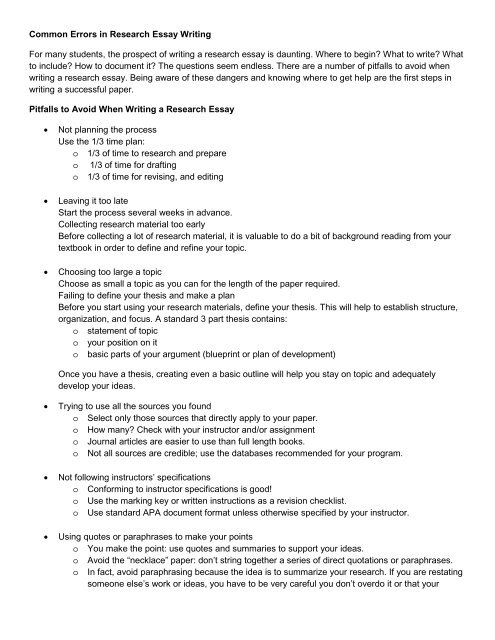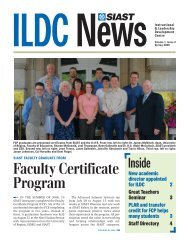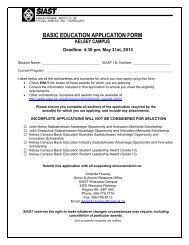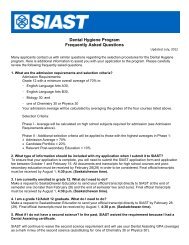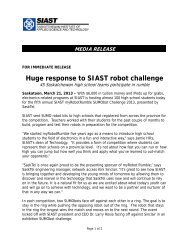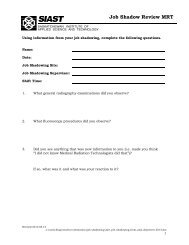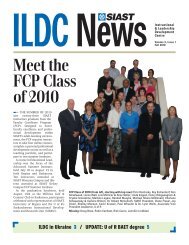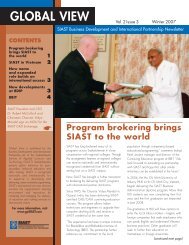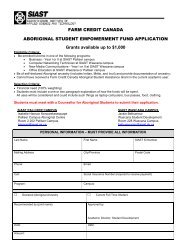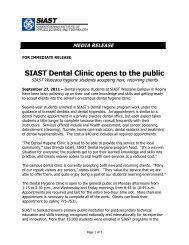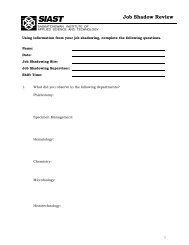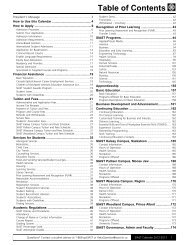Common Errors in Research Essay Writing
Common Errors in Research Essay Writing
Common Errors in Research Essay Writing
Create successful ePaper yourself
Turn your PDF publications into a flip-book with our unique Google optimized e-Paper software.
<strong>Common</strong> <strong>Errors</strong> <strong>in</strong> <strong>Research</strong> <strong>Essay</strong> Writ<strong>in</strong>g<br />
For many students, the prospect of writ<strong>in</strong>g a research essay is daunt<strong>in</strong>g. Where to beg<strong>in</strong>? What to write? What<br />
to <strong>in</strong>clude? How to document it? The questions seem endless. There are a number of pitfalls to avoid when<br />
writ<strong>in</strong>g a research essay. Be<strong>in</strong>g aware of these dangers and know<strong>in</strong>g where to get help are the first steps <strong>in</strong><br />
writ<strong>in</strong>g a successful paper.<br />
Pitfalls to Avoid When Writ<strong>in</strong>g a <strong>Research</strong> <strong>Essay</strong><br />
• Not plann<strong>in</strong>g the process<br />
Use the 1/3 time plan:<br />
o 1/3 of time to research and prepare<br />
o 1/3 of time for draft<strong>in</strong>g<br />
o 1/3 of time for revis<strong>in</strong>g, and edit<strong>in</strong>g<br />
• Leav<strong>in</strong>g it too late<br />
Start the process several weeks <strong>in</strong> advance.<br />
Collect<strong>in</strong>g research material too early<br />
Before collect<strong>in</strong>g a lot of research material, it is valuable to do a bit of background read<strong>in</strong>g from your<br />
textbook <strong>in</strong> order to def<strong>in</strong>e and ref<strong>in</strong>e your topic.<br />
• Choos<strong>in</strong>g too large a topic<br />
Choose as small a topic as you can for the length of the paper required.<br />
Fail<strong>in</strong>g to def<strong>in</strong>e your thesis and make a plan<br />
Before you start us<strong>in</strong>g your research materials, def<strong>in</strong>e your thesis. This will help to establish structure,<br />
organization, and focus. A standard 3 part thesis conta<strong>in</strong>s:<br />
o statement of topic<br />
o your position on it<br />
o basic parts of your argument (bluepr<strong>in</strong>t or plan of development)<br />
Once you have a thesis, creat<strong>in</strong>g even a basic outl<strong>in</strong>e will help you stay on topic and adequately<br />
develop your ideas.<br />
• Try<strong>in</strong>g to use all the sources you found<br />
o Select only those sources that directly apply to your paper.<br />
o How many? Check with your <strong>in</strong>structor and/or assignment<br />
o Journal articles are easier to use than full length books.<br />
o Not all sources are credible; use the databases recommended for your program.<br />
• Not follow<strong>in</strong>g <strong>in</strong>structors’ specifications<br />
o Conform<strong>in</strong>g to <strong>in</strong>structor specifications is good!<br />
o Use the mark<strong>in</strong>g key or written <strong>in</strong>structions as a revision checklist.<br />
o Use standard APA document format unless otherwise specified by your <strong>in</strong>structor.<br />
• Us<strong>in</strong>g quotes or paraphrases to make your po<strong>in</strong>ts<br />
o You make the po<strong>in</strong>t: use quotes and summaries to support your ideas.<br />
o Avoid the “necklace” paper: don’t str<strong>in</strong>g together a series of direct quotations or paraphrases.<br />
o In fact, avoid paraphras<strong>in</strong>g because the idea is to summarize your research. If you are restat<strong>in</strong>g<br />
someone else’s work or ideas, you have to be very careful you don’t overdo it or that your
<strong>in</strong>structors will accept paraphrased research.<br />
• Us<strong>in</strong>g too many quotes<br />
o Only use quotes when a summary will corrupt or lessen the idea.<br />
o Use quotes for authority, eloquence, and control.<br />
o How many quotes? Only 1 – 2 per page and try to keep them short.<br />
o The rema<strong>in</strong><strong>in</strong>g <strong>in</strong>formation should be summarized or paraphrased.<br />
• Plagiariz<strong>in</strong>g and other forms of academic dishonesty<br />
o All <strong>in</strong>formation you got from your sources except common knowledge <strong>in</strong> the field must be<br />
credited – <strong>in</strong> text and on your reference page.<br />
o This means that you should have 4 – 5 <strong>in</strong> text citations per paragraph.<br />
o Don’t rely on only one source per paragraph.<br />
o If you can f<strong>in</strong>d it on the Internet, so can your <strong>in</strong>structor!<br />
o The work must be your own and must be the first time it’s submitted for grad<strong>in</strong>g.<br />
• Skipp<strong>in</strong>g the revis<strong>in</strong>g process<br />
o If the idea doesn’t fit, take it out.<br />
o If you have a hole <strong>in</strong> your ideas, fill it.<br />
• Not check<strong>in</strong>g your documentation<br />
o Follow the APA manual – down to spac<strong>in</strong>g, periods, brackets, ...the works!<br />
• Skipp<strong>in</strong>g the edit<strong>in</strong>g process<br />
o Look for and fix your common grammar and mechanics errors. Use your grammar checker, but<br />
make your own decisions.<br />
o Run the spell checker - - this is a no-bra<strong>in</strong>er! Double-check for homonyms which the spell<br />
checker won’t locate as errors.<br />
o Make sure your f<strong>in</strong>al version is a clean copy.<br />
• Not back<strong>in</strong>g up your documents<br />
o We all learn this one sooner or later – failure to back up your documents <strong>in</strong> more than one place<br />
can mean you may lose all evidence of your work.<br />
• Not ask<strong>in</strong>g for advice<br />
o Ask a friend with strong writ<strong>in</strong>g skills for feedback on your draft, but don’t expect friends or<br />
family to take responsibility for edit<strong>in</strong>g your work.<br />
o Make an appo<strong>in</strong>tment with a writ<strong>in</strong>g <strong>in</strong>structor <strong>in</strong> Learn<strong>in</strong>g Services for some advice dur<strong>in</strong>g the<br />
organizational or draft phases of your work.<br />
Adapted from Lethbridge College Learn<strong>in</strong>g Cafe


